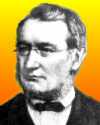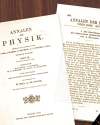 | TODAY IN SCIENCE HISTORY NEWSLETTER - 20 MARCH |
| Feature for Today |
 On 20 Mar 1878, Julius Robert Mayer died, a German physicist who had the idea of the conservation of energy before either Joule or Helmholtz. He held that solar energy was the ultimate source of all energy on earth, both living and nonliving. On 20 Mar 1878, Julius Robert Mayer died, a German physicist who had the idea of the conservation of energy before either Joule or Helmholtz. He held that solar energy was the ultimate source of all energy on earth, both living and nonliving.In this excerpt from "The Century's Progress in Physics" in Harper's New Monthly Magazine (1897) on Julius Robert Mayer and the Conservation of Energy you glean more of the historic background on this topic. As you read the extract, you may reflect on the intellectual capacity for science of 19th-century readers of Harper's, an otherwise general-interest magazine. |
| Book of the Day | |
| |
| Quotations for Today | |
 | "But psychology is a more tricky field, in which even outstanding authorities have been known to run in circles, 'describing things which everyone knows in language which no one understands'." |
 | "A scientist strives to understand the work of Nature. But with our insufficient talents as scientists, we do not hit upon the truth all at once. We must content ourselves with tracking it down, enveloped in considerable darkness, which leads us to make new mistakes and errors. By diligent examination, we may at length little by little peel off the thickest layers, but we seldom get the core quite free, so that finally we have to be satisfied with a little incomplete knowledge." |
 | "Even more difficult to explain, than the breaking-up of a single mass into fragments, and the drifting apart of these blocks to form the foundations of the present-day continents, is the explanation of the original production of the single mass, or PANGAEA, by the concentration of the former holosphere of granitic sial into a hemisphere of compressed and crushed gneisses and schists. Creep and the effects of compression, due to shrinking or other causes, have been appealed to but this is hardly a satisfactory explanation. The earth could no more shrug itself out of its outer rock-shell unaided, than an animal could shrug itself out of its hide, or a man wriggle out of his skin, or even out of his closely buttoned coat, without assistance either of his own hands or those of others." |
| QUIZ | |
| Before you look at today's web page, see if you can answer some of these questions about the events that happened on this day. Some of the names are very familiar. Others will likely stump you. Tickle your curiosity with these questions, then check your answers on today's web page. | |
| Births | |
 |  An American psychologist born 20 Mar 1904 studied the learning processes of animals by providing a lever, or such, to deliver a reward or punishment when the animal pressed it. He extended his theories to the behaviour of humans. An American psychologist born 20 Mar 1904 studied the learning processes of animals by providing a lever, or such, to deliver a reward or punishment when the animal pressed it. He extended his theories to the behaviour of humans. |
 |  Walter M. Elsasser, born 20 Mar 1904, was a German-born American physicist who proposed an explanation forthe origin of the Earth's magnetic field which is still accepted today. Walter M. Elsasser, born 20 Mar 1904, was a German-born American physicist who proposed an explanation forthe origin of the Earth's magnetic field which is still accepted today. |
| Deaths | |
 |  An English physicist and mathematician(1642-1727) made seminal discoveries in several areas of science, and was the leading scientist of his era. His study of optics included using a prism to show white light could be split into a spectrum of colours. The statement of his three laws of motion are fundamental in the study of mechanics. He was the first to describe the moon as falling (in a circle around the earth) under the same influence of gravity as a falling apple. An English physicist and mathematician(1642-1727) made seminal discoveries in several areas of science, and was the leading scientist of his era. His study of optics included using a prism to show white light could be split into a spectrum of colours. The statement of his three laws of motion are fundamental in the study of mechanics. He was the first to describe the moon as falling (in a circle around the earth) under the same influence of gravity as a falling apple. |
| Events | |
 |  On 20 Mar of a certain year, America's first demonstration of the alternating-current system provided lighting along Main Street at Great Barrington, Massachusetts, powered by the first AC power plant in the U.S. to begin commercial operation. On 20 Mar of a certain year, America's first demonstration of the alternating-current system provided lighting along Main Street at Great Barrington, Massachusetts, powered by the first AC power plant in the U.S. to begin commercial operation. Who was the 39-year-old inventor of this AC power system? Who was the 39-year-old inventor of this AC power system? |
 |  On 20 Mar 1916, Albert Einstein's Theory of General Relativity was published. It provided an explanation of a phenomenon in the observed path of Mercury that Newton's gravititational theory could not. It was verified by an astronomical event in 1919. On 20 Mar 1916, Albert Einstein's Theory of General Relativity was published. It provided an explanation of a phenomenon in the observed path of Mercury that Newton's gravititational theory could not. It was verified by an astronomical event in 1919.  What type of event in 1919 provided the verification of Einstein's theory? What type of event in 1919 provided the verification of Einstein's theory? |
| Answers |
When you have your answers ready to all the questions above, you'll find all the information to check them, and more, on the March 20 web page of Today in Science History. Or, try this link first for just the brief answers. Fast answers for the previous newsletter for March 19: Fr�d�ric Joliot-Curie, for their discovery of artificially prepared, radioactive isotopes of new elements; Louis Victor Pierre Raymond duc de Broglie; Madame Tussaud's; as the sled was rapidly braked from this high speed, Stapp experienced the effect of sudden deceleration to simulate and test the effects on pilots bailing out of airplanes travelling at supersonic speeds; electric eels. |
| Feedback |
 If you enjoy this newsletter, the website, or wish to offer encouragement or ideas, please send feedback by using your mail reader Reply button. If you enjoy this newsletter, the website, or wish to offer encouragement or ideas, please send feedback by using your mail reader Reply button. |
--
If you do not want to receive any more newsletters, Unsubscribe
To update your preferences and to unsubscribe visit this link


Δεν υπάρχουν σχόλια:
Δημοσίευση σχολίου